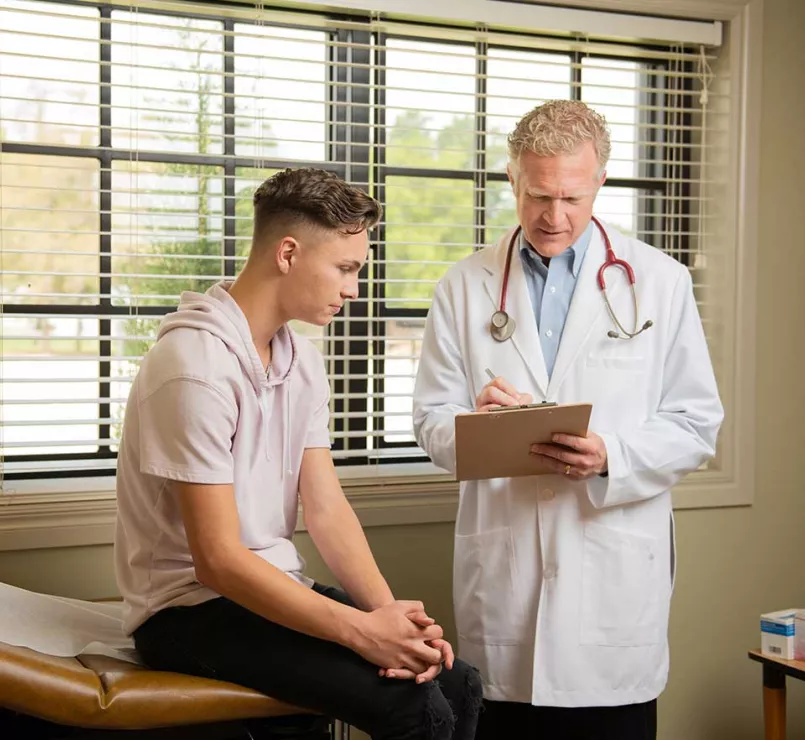Physical and Mental Healthcare
Covenant House provides young people facing homelessness with sanctuary and immediate and ongoing care for their physical and mental health issues and needs. Our trauma-informed, strengths-based programming is designed to help them deal with the mental and physical health effects of homelessness as they advance toward a healthy and independent future.

Meeting Physical Healthcare Needs for Youth Facing Homelessness
Homelessness takes an enormous toll on young people. Each year, thousands of youth experiencing homelessness die on the streets due to illness, assault, or suicide. In addition to ensuring their physical safety, Covenant House provides holistic medical care to help our young people stabilize their physical health.
Sleeping on the streets or in crowded shelters leave youth vulnerable to a variety of illnesses and infections, such as flu, pneumonia, and hepatitis.
Because young people living unstably often lack health insurance, these problems go unchecked, medication is beyond their reach, and even a minor untreated infection can morph into a major health emergency. Many physical healthcare issues go untreated, leading to worsening outcomes and chronic illnesses like diabetes and hypertension.
Young people experiencing homelessness are also at risk for facing long-term food insecurity, lacking access to an adequate supply of nutritious, affordable food. This leads to additional health complications as hunger and lack of nutrition impacts developmental, behavioral, and psychological growth in young people.
Our wellness services range from medical care at our on-site health centers to yoga classes, music lessons, counseling, religious and spiritual services, and sports. In these activities, young people retake control over their lives, build on their strengths, and nourish their self-confidence.
Meeting Mental Healthcare Needs for Youth Facing Homelessness
Mental healthcare is one of our foundational interventions at Covenant House. More than half of all young people in the U.S. express symptoms of anxiety and/or depression. Adolescents are particularly vulnerable as they are still developing cognitively, psychologically, and emotionally. In addition to this, our youth have often experienced:
- Physical abuse
- Sexual abuse
- Domestic violence
- Street violence
- Years of trauma from living unhoused
In most cases, mental health challenges go undiagnosed. At Covenant House, the most common diagnoses include major depressive disorder, anxiety, bipolar disorder, and PTSD. Our data tells us that LGBTQ+ youth are more likely to experience mental health challenges than their peers.
Our youth are often afraid of derogatory labels and terms they have heard to describe mental health issues and are afraid of the stigmas associated with therapy. The association is alarming and triggering to them, making them reluctant to open up about their experiences. This is particularly prominent in survivors of human trafficking.
At Covenant House, we design all of our programs through a trauma-informed, strengths-based lens, and we aim to ensure that all staff—not just our mental health staff—are able not only to receive every young person who comes to Covenant House with unconditional love and absolute respect, but also to respond in the event of a mental health emergency.
We offer young people both traditional one-on-one and group talk therapy as well as a variety of alternative therapies involving music, art, sports, recreation, and even equine and pet therapy at some Covenant House sites.
Addressing Substance Use Among Youth Facing Homelessness
Young people experiencing homelessness face higher rates of alcohol and drug use. For many, substance use offers a means of escape from the physical and emotional trauma associated with life on the streets.
Covenant House is equipped to work with young people experiencing substance use challenges. Youth Mental Health First Aid is an evidence and skills-based training course that teaches participants about mental health and substance use issues in youth. This 8-hour certificate course been prioritized across our movement to:
- Teach skills to reach out and provide support to a young person who may be developing a mental health or substance use challenge or experiencing a crisis
- Cover signs and symptoms of mental health challenges in this age group, including anxiety, depression, eating disorders, Attention Deficit Hyperactivity Disorder (ADHD), psychosis, and crisis situations like suicide and overdose
Many Youth Facing Homelessness Experience Trauma
Every young person who comes to Covenant House has some degree of trauma as a result of their households and communities of origin or their time living unhoused.
Half of our youth report dealing with a mental health challenge.
One-third of our youth were placed in foster care.
One-quarter of our youth experienced domestic violence.
How We Approach the Well-being of Young People Facing Homelessness
Our work recognizes the deep impact trauma has had on our youth and the centrality of building mental health resilience and ongoing physical wellness to help them move forward with their lives. We have a number of programs and policies that help center mental and physical healthcare in our sites.
Open Intake
One thing that makes our work different from many other youth-serving organizations is our open intake policy. Our doors are open 24/7 for any youth in crisis, so they can get the services they need at any time.
Holistic Healthcare
Young people find the physical and mental healthcare they need from the moment they enter our doors to the moment they're ready to set out on their own.
Attentive Staff
Our care is built on the kindness and expertise of our staff who provide absolute respect, unconditional love, and relentless support to every young person in our care.

Shelter Is Only the Beginning
From crisis to care: Find out what it's like when a young person enters our doors.


